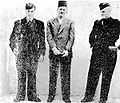Mustapha Benboulaïd
| Mostefa Ben-Boulaïd | |
|---|---|
 Mustapha Benboulaïd, the "father of the Algerian revolution". | |
| Born |
February 5, 1917 Arris, French Algeria (now Algeria) |
| Died |
March 22, 1956 (aged 39) Arris, French Algeria (now Algeria) |
Cause of death | Killed in action (KIA) |
Resting place | Arris, Algeria |
| Organization | Armée de Libération Nationale (ALN) |
Political movement |
Front de Libération Nationale (FLN), Comité Révolutionaire d'Unité et d'Action (CRUA), Organisation spéciale (OS) |
| Religion | Sunni Islam |

Mostefa Ben-Boulaïd (Arabic: مصطفى بن بولعيد) (5 February 1917 – 22 March 1956) was an Algerian Berber (Chaoui) revolutionary leader.
Biography
World War II
Ben-Boulaid was born in Arris, Batna Province, Algeria. In 1939, he underwent mandatory military service and was mobilized to fight for the allies during the Second World War. In 1944, during the Italian campaign, Ben-Boulaid exhibited courage, which earned him the Military Medal and the Croix de guerre. He was demobilised with the rank of adjutant, returned home, and joined the Algerian People's Party (PPP).
Revolutionary figure
Ben-Boulaid became an important political and military figure in the Special Organization (OS). He bought weapons with his own funds, supported militants being pursued by the French authorities and distributed arms. Ben-Boulaid contested the Assembly of Algeria election of 1948 and won decisively. However, the results were falsified by the French authorities.[citation needed] He was a founding member of the Revolutionary Committee of Unity and Action (CRUA). From 22–25 June 1954, he chaired a crucial meeting which aimed to unite the revolutionary forces. He became a member of the "Committee of the Six" ( the insurgent leaders). During the Algerian war, Ben-Boulaid was responsible for Area I (Aurès). He engaged heavily armed French forces and suffered heavy losses. In 1955, he traveled to Libya to purchase arms. He participated in the battle of Ifri el blah and the battle of Ahmar Khaddou near Batna.
Arrest and escape
On 11 February 1955, Ben-Boulaid was arrested in Tunisia. He was photographed standing between two French soldiers. The soldiers did not know that by posing with his thumbs entwined, Ben-Boulaid was sending a message to his supporters asking for help. (See picture below.) Ben-Boulaid was imprisoned at "Coudiat Aty" Central Prison in Constantine and was sentenced to death. In November 1955, with the complicity of a prison warden, Djaffer Chérif, who was from Ben-Boulaid's home town, Ben-Boulaid escaped, along with other prisoners. One of the other prisoners was Tahar Zbiri, who went on to initiate a failed coup against President Houari Boumediene in 1967. During the escape, one of Ben-Boulaid's comrades was injured, recaptured, and subsequently decapitated.
Death
On 22 March 1956, Ben-Boulaïd died in the blast of a parachuted French radio bomb, along with a friend, Abdelhamid Amrani.
Gallery
-

The tomb of Si Moustefa (right) and his companion Amrani (left) in Nara, Arris wilaya of Batna
-

Photo taken after his arrest in Tunisia (11 February 1955). Benboulaïd transmitted a message symbolizing unity with his thumbs.
Legacy
The main squares of Batna and Arris host busts of Ben-Boulaid. In Batna, an alley and a high school was named for him. In Annaba, one of the avenues that connects Bertagna boulevard (formerly Cours Bertagna) and the Avenue of the Revolution bears his name as do the neighborhoods of Saint-Cloud, Plaisance and Kouba, and beaches and Chapuis Toche. The airport of Batna is named after Ben-Boulaid.
Film
In 2006-2007, Ahmed Rachedi produced a documentary called, A film about Ben-Boulaïd in collaboration with the Ministry of Veterans (Ministère des Moudjahidine) and the Ministry of Culture (Ministère de la culture et l'entreprise) and Missane Balkis films. It was part of the 2007 festival, "Algiers, Capital of Arab Culture" ("Alger, capitale de la culture arabe 2007").[1]
Similar Wikipedia articles
Books
- Au forgeron de Batna, Jean-Pierre Marin, foreword by Jean Deleplanque [2]
External links
- Biographic article in Monde, Algeria, (Biographie sur Algérie-Monde.com)
- Photo in a gallery of Algeria's revolution heroes (Elias Filali Pbase)
- Official FLN website (site consacré au Front de libération nationale), at Jeeran.com.
